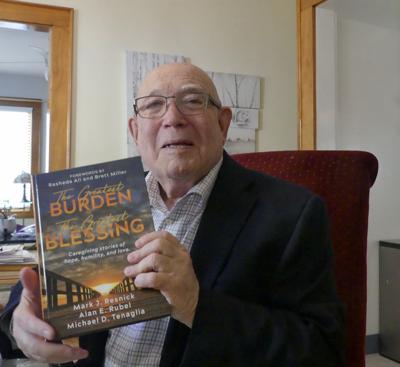BARRE — Just about everyone, sometime in their life, is a caregiver — for a parent, child, spouse or friend. Caregiving can be immensely rewarding but also can be emotionally draining, physically exhausting and a significant financial burden on a family. As often as not, caregivers are thrown, head-first into situations for which they are ill prepared.
Alan Rubel, of Barre — who cared for his partner, Sharon, for 12 years — and his two co-authors and co-editors, Mark Resnick and Michael Tenaglia, have compiled 44 short stories they hope will give caregivers, who feel overwhelmed, lessons on what to do and insight on how to cope when the task seems too difficult to bear.
In their self-published book, “The Greatest Burden, The Greatest Blessing,” the authors have compiled stories on dealing with a range of conditions, from Alzheimer’s to autism, Down syndrome, cancer, mental health disorders, Parkinson’s disease, paralysis, PTSD, and more.
There is even a chapter on dealing with the death of a beloved pet.
“There is no course or manual on how to be a caregiver, you will almost certainly be unprepared,” Rubel said.
“Like a million others before her, Sharon’s cancer battle began with a routine checkup with her primary care physician,” Rubel wrote in his story, “The Reality of Cancer.”
A cancer diagnosis is bad enough, Rubel said, but added to their woe was the fact that they got mixed messages from physicians. One physician said the problem was tumors; another said Sharon had liver cancer; one said Sharon would likely die soon; and another said that wasn’t accurate. The correct diagnosis was neuroendocrine cancer.
The biggest burden for them was the 178-mile trip to Boston every three to four weeks for 12 years as part of the treatment. Due to needed rest stops, the trip took four to five hours each way. Fortunately, while in Boston, they stayed with their son and his family and didn’t have to pay for a hotel room.
“Being Sharon’s caregiver was the hardest thing I’ve ever done in my life. Without hesitation, I would do it again tomorrow,” Rubel writes.
The various authors featured include several fairly well-known personalities, such as Rasheda Ali Walsh, Muhammad Ali’s daughter, an author and Parkinson’s disease advocate; Brett Miller, founder of 110 Fitness in Rockland, Massachusetts, the largest wellness center in the world for people with Parkinson’s disease; and Brenda and Lee Roy, whose son Travis, seriously injured on his first shift playing hockey for Boston University, set up the Travis Roy Foundation, dedicated to enhancing the life of spinal cord injury victims and their families.
In addition to Rubel, several of the authors are from Vermont including Judy Peterson, the former executive director of the Central Vermont Home Health and Hospice as well as the University of Vermont Health Network Home Health and Hospice (formerly the VNA of Chittenden and Grand Isle Counties); Diana Peirce, the longtime hospice director at CVHHH; Vermont authors Jane Dwinell and Bob Bennett; and Vicki Langevin and Susan Scheer.
“The book is a collection of bite-sized chapters on a wide range of caregiving experiences,” Rubel said. “(They) are geared to help caregivers cope in what can be a very difficult time.”
The three authors decided to write the book when they met at Massachusetts General Brigham Hospital in Boston.
“Alan Rubel and I sat across from each other, waiting for our spouses, Sharon and Lynda, who were both recovering from surgical procedures in their respective battles against cancer. Then we met again later, this time in the recovery room. Some may call it coincidence, others may call it destiny,” Resnick wrote in the acknowledgments.
Rubel and Tenaglia had met earlier under similar circumstances, and they asked Resnick, who had written several books including “Ten Days With Dad,” to join them in writing this book. Resnick is co-author for several of the stories.
“The book is a testament to the fact that while caregiving may be one of life’s greatest burdens, it is also an extraordinary blessing,” Rubel said.
According to Resnick, the authors had hoped to land with a traditional publisher, but when that didn’t happen, they decided to go forward anyway because of their belief in the power of their collection.
The authors are using a fairly unique plan to promote their book. In the back of the book there is a list of several dozen sponsors who each agreed to buy at least 15 copies to give them to their employees, customers and friends.
The most important lessons from the book, Rubel said, is caregivers need to know: They are not alone.
“If you are currently serving as a caregiver, then please know that no matter how large or small your caregiving role is, you make a difference each and every day,” the authors write in the introduction. “Know that you are not alone. Know that you are appreciated. And know that you are loved.”
Copies of the book are available at local bookstores and online.


